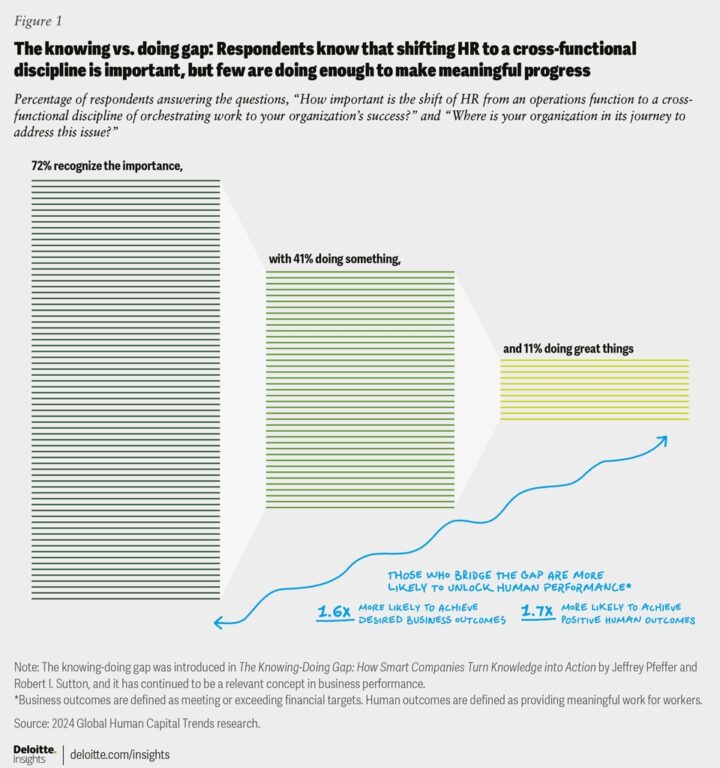Deloitte: Why HR needs to be everyone’s job in 2024
It’s time for organizations to let go of the old ways of working, and embrace boundaryless HR, says Deloitte’s 2024 Global Human Capital Trends report.
Research Insights
Deloitte's 2024 Global Human Capital Trends report calls on organizations to reset and rethink how they work.
To do this, HR needs to become boundaryless and part of everyone's skills - and CHROs need to become 'chief work officers'.
Find out more in this deep dive.
Organizations are stuck in the past.
They aren’t built for the new mode of work; one where people are disrupted, skills (not jobs) are the workplace currency, and “lightning-fast” advances in technology – particularly AI – power our employee experiences.
That’s the view of Deloitte’s 2024 Global Human Capital Trends Report.
The good news is that the professional services giant’s survey of 14,000 people across 95 countries found that leaders and organizations are aware that something needs to change.
53% agree that there’s a need to move beyond inputs, and towards outputs, as well as ensure that work is adding value to employees’ lives (as well as wider society) – but just 8% said their organization was leading in this area.
Deloitte’s report shared that there is a need to find “the bridge between knowing what shifts are shaping the future of work and doing things to make real progress toward putting them into action to create positive outcomes”.
To do this, organizations “will need to let go of the mindsets, operating constructs, and proxies of the past”, shared the report.
It’s time for HR to go boundaryless
One important mindset shift is to make sure businesses aren’t prioritizing business outcomes at the expense of the wellbeing and productivity of their people.
It’s time to put “humans back at the center of work — after all, it is humans, more than any physical assets, that drive business performance”, shared Art Mazor, global human capital practice leader at Deloitte.
To achieve this, leaders should focus less on how much people benefit their organization and more on how much their organization benefits people.”
Currently just four in ten people say their organization prioritizes them over business outcomes.
And just 43% said their organizations left them better off than when they started.
All of this was also noted by a recent global report from Dayforce (formerly known as Ceridian), and helps to explain why burnout rates remain worryingly high.
A mindset shift is also needed around skills – yes, AI and digital skills are important, but all the data (from the likes of LinkedIn, Mercer and the World Economic Forum) is showing that people capabilities must be prioritized.
Deloitte’s research takes this conclusion on the importance of people skills one step further, and calls for a complete rethink of the HR function.
It needs to transition from being an operational function separate from the business – and towards being co-created and integrated into the wider company.
The idea is that “boundaryless HR can develop people-discipline expertise and weave it throughout the fabric of the business, creating multidisciplinary solutions to increasingly complex problems”, according to Deloitte’s 2024 report.
It is no longer sufficient for HR teams to own that people expertise, now everyone needs to be upskilled and reskilled in people discipline. HR cannot create the people-first future of work all on its own.
There is a huge knowing versus doing gap around HR becoming boundaryless and integrated – 72% of respondents told Deloitte the recognized the importance here.
Yet only 41% are doing something, and just one in ten are doing what Deloitte terms “great things”.
If organizations can figure this ‘knowing vs. doing gap’, Deloitte claims they are 1.6x more likely to achieve their desired business outcomes, and 1.7x more likely to have positive human productivity outcomes.

How to make boundaryless HR a reality
But where must HR teams, and organizations as a whole, start to transform to boundaryless HR?
Deloitte’s report is clear that the CHRO needs to lead this work, and actually rethink their job role to be more like a ‘chief work officer’.
The next step is transforming managers into people leaders, and really rewarding and recognizing them for their people skills. They need to be empowered with data and analytics to make people-focused decisions for their people.
Trust is also top of mind for Deloitte in 2024 – it’s time for employers to encourage workers to not consume people and HR policies, but to actually share their thoughts and co-create the strategies with their colleagues and leaders.
For HR teams, it may seem like your job is disappearing – but that’s not the case. This is an opportunity for HR to upskill itself in other areas of the business, and take on a different type of responsibility.
Ultimately, there’s no doubt that this work is going to be hard – a third of executives told Deloitte that this was in their top three most difficult challenges – but getting this right will reap amazing rewards for people and businesses alike.
Looking for inspiration? You can follow in the footsteps of brands like Johnson & Johnson, Octopus Energy and Standard Chartered Bank!
These are just some takeaways from the Deloitte report. Want to delve into the data in more detail? You’re in luck, we’re hosting it on UNLEASH here!
Sign up to the UNLEASH Newsletter
Get the Editor’s picks of the week delivered straight to your inbox!

Chief Reporter
Allie is an award-winning business journalist and can be reached at alexandra@unleash.ai.
